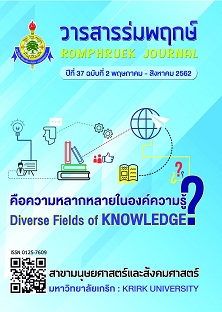Power and Knowledge with the Right to Refuse Treatment at the Terminal Stage of Life
Main Article Content
Abstract
This research article derived from a qualitative research. The objectives of this research were to 1) analyze the concept of using the doctors' power and knowledge in treating patients who were at the terminal stage of life, and 2) analyze the guidelines for treating patients who were at the terminal stage of life. The data for this research received from six key informants: an experienced physician, a physician, a nurse, a patient and a patient relative through in-depth interviews. The phenomenological data analysis was used for data analysis. The results found that the medical culture in Thailand aimed to extend the patient’s life as long as possible. The power and knowledge of the physicians have been conducted through specialized medical fields and through medical social institutions for a long time. Such expertise makes patients succumb to treatments that may not be needed and lead to medical futility. All interviewees agreed with Section 12 of the National Health Act, B.E. 2550 that a person shall have the right to make a living will in writing to refuse the public health service which is provided merely to prolong his/her terminal stage of life or to make a living will to refuse the service as to cease the severe suffering from illness. But the physicians who were interviewed in this research were in doubt and needed the clarification about the details written in the living will, for example the definition of the words "permanent unconsciousness". Therefore, in terms of the development of a palliative care system, it provided the operational definitions of the related terms, and educated patients about the right to make a living will in writing which could be the guidelines for treating patients who were in the terminal stage of life.
Article Details
Every article published in the Romphruek Journal of the Humanities and Social Sciences is the opinion and point of view of the authors. Thery're not the viewpoint of Krirk University or the editored department. Any part or all of the articles for pablication must be clearly cited.
References
กฎกระทรวง. (2553). กําหนดหลักเกณฑ์และวิธีการดำเนินการตามหนังสือแสดงเจตนาไม่ประสงค์จะรับบริการ
สาธารณสุขที่เป็นไปเพียงเพื่อยืดการตายในวาระสุดท้ายของชีวิต หรือเพื่อยุติการทรมานจากการเจ็บป่วย พ.ศ. 2553.
(7 พฤศจิกายน 2560) สืบค้นจาก http://www.thailivingwill.in.th/sites/default/files/022_livingwill.pdf.
กิตติพงศ์ อุรพีพัฒนพงศ์, สัมภาษณ์, 3 กันยายน 2560
กิตติพงศ์ อุรพีพัฒนพงศ์. (2560). ออกแบบความตายสร้าง "พินัยกรรมชีวิต" เพื่อความสุขสุดท้าย.
(3 กันยายน 2560) สืบค้นจาก https://www.matichon.co.th/news/650989.
ฉันทนา หมอกเจริญพงศ์. (2559). ความสูญเปล่าทางการแพทย์ (Medical Futility). กรุงเทพฯ : สามดีพริ้นติ้งอีควิปเมนท์.
นภัส คำนวน. (2558). ปัญหาทางกฎหมายเกี่ยวกับหน้าที่และจริยธรรมของแพทย์เมื่อผู้ป่วยใช้สิทธิปฏิเสธการรักษาในวาระสุดท้าย. คณะนิติศาสตร์ มหาวิทยาลัยธุรกิจบัณฑิตย์, กรุงเทพฯ.
กระทรวงสาธารณสุข. (2553). พระราชบัญญัติสุขภาพแห่งชาติ พ.ศ.2550. (7 พฤศจิกายน, 2560) สืบค้นจาก https://www.nationalhealthor.th/sites/default/files/upload_files/hpp_act_e-book58_08_07_453.pdf.
พรเลิศ ฉัตรแก้ว. (2554). Advance care planning and living will. กรุงเทพฯ : ทีคิวพี.
ภาวิกา ศรีรัตนบัลล์. (2559). “ไม่ยากที่ให้ สุขใจที่รับ”. กรุงเทพฯ : สามดีพริ้นติ้งอีควิปเมนท์.
สฤษดิ์ กิ่งแสง. (2557). มาตรการทางกฎหมายเกี่ยวกับสิทธิของผู้ป่วยในการปฏิเสธการรักษาพยาบาล.
วารสารวิชาการมหาวิทยาลัยปทุมธานี, 6(2), 164-174.
สำนักงานคณะกรรมการสุขภาพแห่งชาติ. (2554). คู่มือผู้ให้บริการสาธารณสุข กฎหมายและแนวทางการ
ปฏิบัติที่เกี่ยวข้องกับการดูแลผู้ป่วยระยะสุดท้าย. กรุงเทพฯ : ทีคิวพี.
สำนักงานคณะกรรมการสุขภาพแห่งชาติ. (2558). คำพิพากษาศาลปกครองสูงสุดสิทธิการตายอย่างธรรมชาติ
กรณีกฎกระทรวงตามมาตรา 12 แห่งพระราชบัญญัติสุขภาพแห่งชาติ พ.ศ. 2550. กรุงเทพฯ : สามดีพริ้นติ้งอีควิปเมนท์.
Doyle, D. & Woodruff, R. (2013). The Iahpc Manual Of Palliative Care. (March 23, 2018)Retrieved from https://hospicecare.com/uploads/2013/9/The%20IAHPC%20Manual%20of%20Palliative%20Care%203e.pdf.


